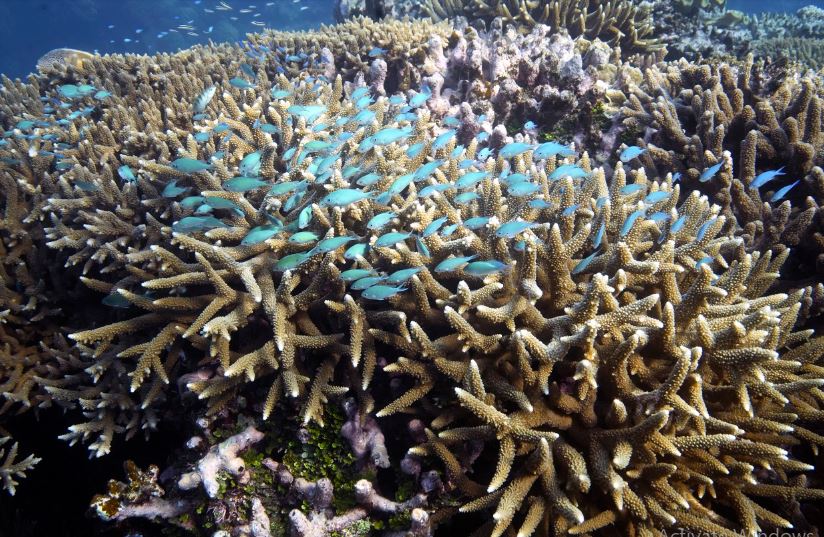A Japanese filmmaker imprisoned for nearly four months
Toru Kubota, who was imprisoned for about four months, urged Tokyo to...

Australia denies the Great Barrier Reef’s designation as being in danger.
Australia’s CANBERRA — The Great Barrier Reef will be lobbied against by Australia’s government, the country’s environment minister announced on Tuesday.
The greatest coral reef in the world is in danger, according to a report released on Monday by representatives of the United Nations cultural agency and the International Union for Conservation of Nature.
The Great Barrier Reef, which was listed as a World Heritage Site in 1981, was visited by a 10-day mission in March that resulted in the report that suggested the reef system be given endangered status.
The report, according to Australia’s former conservative government, which was ousted in May elections after nine years in office, according to Environment Minister Tanya Plibersek.
She claimed that several of the issues raised in the report, including action on climate change, have already been handled by the current center-left Labor Party administration.
According to Plibersek, “We’ll make it very clear to UNESCO that there is no need to single out the Great Barrier Reef in this way” with an endangered status.
“UNESCO has previously identified a location as being at risk because they wanted to see increased government action or investment, and both of those things have occurred after the change of government,” she continued.
Australia has been mandated by the incoming government to cut its greenhouse gas emissions by 43% below 2005 levels by 2030.
By the conclusion of the decade, the previous administration had only committed to a decrease of 26% to 28%.
Plibersek claimed that her administration has also scrapped plans by the previous administration to erect two major dams in Queensland state that would have impacted the water quality of the reef and has dedicated 1.2 billion Australian dollars ($798 million) to its preservation.
Every coral reef in the world is in danger, according to Plibersek, “if the Great Barrier Reef is in danger.” The majority of World Heritage sites worldwide are in danger from climate change, if this World Heritage site is in danger.
According to the research, Queensland authorities and Australia’s federal government should set more aggressive emission reduction goals to support global efforts to keep future warming to 1.5 degrees Celsius (2.7 degrees Fahrenheit) since pre-industrial times.
In light of the study, the minor Greens party demanded that the government do more to combat climate change. The minor Greens party wants Australia to reduce emissions by 75% by the end of the decade.
Jodie Rummer, a marine biologist at James Cook University in Townville who has spent more than ten years working on the reef, backed demands for Australia to set a target of reducing emissions by 75%.
Rummer said Australian Broadcasting Corporation, “We are acting, but that response needs to be much more swift and much more urgent.”
“At this time, we couldn’t say that we’re doing everything we can for the reef. We’re not. We must convey to the rest of the world that we are doing everything in our power to protect the reef, and in order to do that, we must immediately take urgent action to reduce emissions.
Before the Paris-based UNESCO issues any official recommendations to the World Heritage committee, feedback from Australian government representatives at the federal and state levels will be evaluated.
When UNESCO attempted to downgrade the status of the Great Barrier Reef to “in danger” in July of last year due to harm brought on by climate change, the previous Australian government was able to secure sufficient international backing to prevent this.
10% of the world’s coral reef ecosystems are found on the Great Barrier Reef. Over 2,500 reefs make up the 134,000 square mile network.
In the fourth such widespread incident in seven years, Australian government scientists announced in May that more than 90% of Great Barrier Reef coral inspected in the most recent year was bleached.
The Great Barrier Reef Marine Authority stated in its annual report that although bleaching is brought on by global warming, this is the reef’s first bleaching incident during a La Nia weather trend, which is linked to colder Pacific Ocean temperatures.
Two-thirds of the coral was harmed by bleaching in 2016, 2017, and 2020.
Scientists anticipate that most of the coral will recover from the most recent occurrence. Coral bleaches in reaction to heat stress.
Catch all the Business News, Breaking News Event and Latest News Updates on The BOL News
Download The BOL News App to get the Daily News Update & Live News.